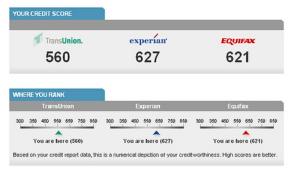Teens: Building Your Credit Score from the Ground Up
Hey, MomVesting readers! Here's a step-by-step article about building credit, laid out in easy terms for all the young people we love. Feel free to share with the young adults in your lives!
When first starting out in building your financial path, you may be confused by the many details that go into personal finances. Checking accounts, credit cards, debits, loans, credit scores – eek! It may seem overwhelming. Fortunately, it doesn't have to be. Let's take a look at one of the major parts of your financial life: your credit score.
Explaining the Credit Score
Okay, so let's jump in with a simple explanation of the credit score. A credit score is basically just a number on a scale. But it's an important number on an important scale because it shows how well you are handling your finances.
The credit scale runs from 300 to 850, and anything over 720 is considered good. When you begin to handle money and take out loans, your credit score is pretty much non-existent. But over time, your score will begin to reflect how you handle your money. When you make payments on time, your credit score can build up to or above 720. If you miss payments, are late on payments, or default on a loan (stop making payments altogether), your credit score can decrease.
So why is this important? Well, a good credit score can help you obtain more credit later for bigger things, like a car or house. And a good score can make the interest rate on these items much lower than it would be with a bad score. It can also help you land a job because tons of employers check your credit score to see if you are a responsible person.
How to Build a Good Score
Now that we have some background, let's look at some of the best ways to build a credit score when you're young – without getting buried under payments.
- Get a Co-Signer: One way to build your score is to take out a loan, and if you are responsible for buying a car, this option could be a contender. When you're young with little or no credit score, though, many banks will not lend to you without a co-signer. In this case, you can appeal to an adult to sign on the loan with you.
- Take on a Credit Card: Another option when building a credit score from scratch is to take out a credit card – and then use it extremely responsibly. This means that you should ideally use the card for normal monthly purchases, like gas, and pay it off every month.
- Pay Your Bills: One very important place where you can help your credit score is by paying your bills on time, every time. This obviously includes every loan and every credit card, but it can extend to other bills as well, like cell phone, rent and utilities. These non-credit bills won't report your good behavior to the credit agencies like credit companies will, but they can (and will) report any negative things, like non-payment, which will of course bring your credit score down.
So that's it: building your credit score from the ground up. As you move forward in life, every loan and credit card that you take out – including loans for college – can help build your score over time. Be kind to your credit companies, and your score will be kind to you.
- Login to post comments
-







Recent comments